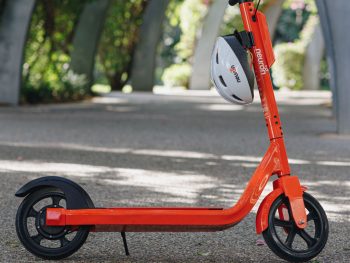Neuron Mobility teams up with UK’s RoSPA to drive e-scooter best safety practice
E-scooter operator Neuron Mobility has teamed up with the UK’s Royal Society for the Prevention of Accidents (RoSPA) on a project which will lead the way in best safety practice for the e-scooter market.

The unique rider course will provide theoretical and practical lessons on how to ride safely on Britain’s roads
The collaboration will see the creation of a unique rider course, designed with Neuron’s e-scooters in mind, to provide theoretical and practical lessons on how to ride safely on Britain’s roads. It will be delivered around the country at key e-scooter hubs in city centres, community parks and on university campuses.
This is an important step in ensuring that the roll-out of shared e-scooters is matched by rigorous user education. Neuron, the largest e-scooter operator in Australia and New Zealand, has already shown itself to be the industry leader in safety, and has introduced an impressive number of innovative world firsts and pioneering features to the e-scooter market.
Neuron launched the world’s first app-controlled helmet lock, which secures a helmet to every e-scooter in between trips, preventing helmets being discarded or stolen, and increasing usage among riders.
Other features include: topple detection that detects if an e-scooter has been left on its side, which then alerts an operations team to reposition it safely; a 999 emergency button which can tell if someone has had a fall and helps the rider call the emergency services; and voice guidance to educate and warn riders on how to ride safely. A “Follow my Ride” function allows the rider’s friends and family to track an e-scooter trip in real time for added safety and peace of mind.
The combination of GPS and geofencing technology, pioneered by Neuron, allows councils to dictate and control exactly where e-scooters can be ridden and parked, and how fast they can travel in different areas. This technology can be used to create “slow zones”, where the maximum riding speed is automatically reduced, such as around a school or nursery. It can also be used to create “no-go” zones and “no parking” zones, giving councils the power to control the travel of e-scooters through a particular area, and to determine where they are allowed to be left.
The announcement comes as Neuron – already the favourite “safety-first” e-scooter operator in Australia and New Zealand – prepares to launch in multiple cities across the UK.
Zachary Wang, CEO of Neuron Mobility, said: “Safety is at the heart of everything we do at Neuron so we are delighted to partner with RoSPA, the UK’s experts in accident prevention.
“We have already won a number of contracts to operate our e-scooters in the UK and councils have been impressed with our safety credentials. We look forward to rolling out a safety course with RoSPA that will have a real impact on the safety of our riders and also the general public in the cities where we operate.
“Neuron and RoSPA share a common goal which is to keep people safe and prevent accidents on the road. We are excited to do our bit in educating a wave of new riders on how to enjoy rental e-scooters in a safe way.”
Errol Taylor, RoSPA chief executive, said: “As the world adapts to life with COVID-19, it is more important than ever to encourage commuters to choose safe, socially-distant, travel options, such as e-scooters. As e-scooter trials roll out in the UK, we are delighted to be partnering with Neuron to educate the public on the safest way to ride.
“Neuron’s core focus on safety and their innovative, world-leading e-scooter makes them an ideal partner for RoSPA, and we look forward to working jointly with them to enable healthy, active lives through good education.”
Today’s announcement follows the Government’s decision to accelerate e-scooter trials in the wake of the COVID-19 pandemic as a safe, socially-distanced and susta

